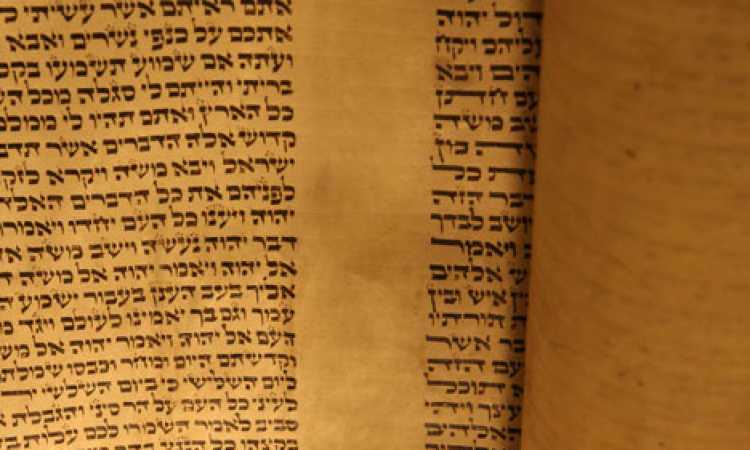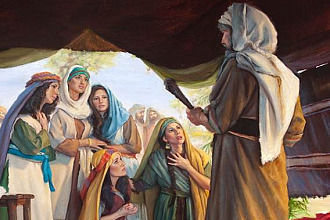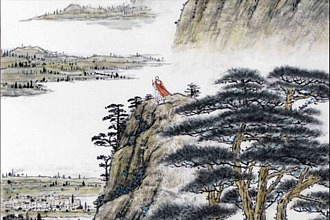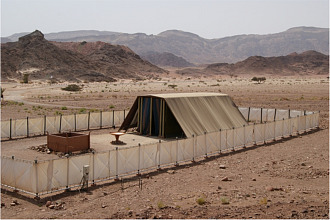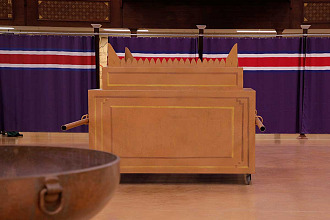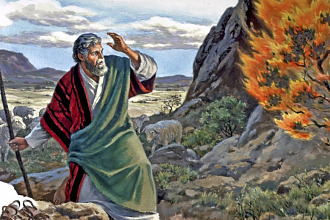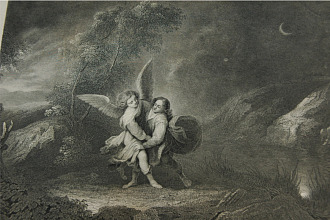Parasha for the Week: Behar-Bechukotai Leviticus 25:1 – 27:34
Haftarah for the Week: Jeremiah 32:6 - 27
Apostolic Writings: Matthew 24:1 - 3
OVERVIEW: BEHAR
The Torah prohibits normal farming of the Land of Israel every seven years. This “Shabbat” for the Land is called shemita. After every seventh shemita, the fiftieth year the yovel (jubilee) is announced with the sound of the shofar on Yom Kippur. This was also a year for the Land to lie fallow. G-d promises to provide a bumper crop prior to the shemita and yovel years. During yovel, all land is returned to its original division from the time of Joshua, and all indentured servants are freed, even though they have not completed their six years of work. An Israelite servant may not be given any demeaning, unnecessary or excessively difficult work, and may not be sold in the public market. The price of his labor must be calculated according to the amount of time remaining until he will automatically become free.
The price of land is similarly calculated. Should anyone sell his ancestral land, he has the right to redeem it after two years. If a house in a walled city is sold, the right of redemption is limited to the first year after the sale. The Levites’ cities belong to them forever. Israel are forbidden to take advantage of one another by lending or borrowing with interest. Family members should redeem any relative who was sold as a servant as a result of impoverishment.
Overview: Bechukotay
The Torah promises prosperity for the Jewish People if they follow G-d’s commandments. However, if they fail to live up to the responsibility of being the Chosen People, then chilling punishments will result. The Torah details the harsh historical process that will fall upon them when Divine protection is removed. These punishments, whose purpose is to bring the Jewish People to repent, will be in seven stages, each more severe than the last. Sefer Vayikra, the book of Leviticus, concludes with the details of erachin—the process by which someone vows to give the Beit Hamikdash (Temple the equivalent monetary value of a person, an animal or property.
BEHAR AND BEKHUKOTAI
This Shabbat we read again the two last Parashot of Leviticus called Behar (25:1-26:2) and Bekhukotai (26:3-27:34). With these readings we conclude the third book of the Torah, the book of Leviticus (Vayikra).
The Hebrew word Behar, is composed of two words: be and har, be is a preposition and means “in” or “on” and har means “Mountain” thus the translation of Behar is “on Mount”, the next word in the parasha is “Sinai”. G-d wants to specify that these rules as the entire Torah were given on Mount Sinai.
The Hebrew word Bekhukotai, is also composed of two words: be and khukotai, from the root khok / khuk which means “decree” and “statute” and the suffix “Ai” read like English “I” is the possessive “My”. Bekhukotai means “in my decrees.” It is an invitation to stay in the decrees of the L-rd or to follow His laws.
BEHAR and MOUNT SINAI
The preceding verses of the Torah teach us that G-d is the source of all love and justice. The Laws of G-d are the manifestation of G-d’s Character which is love. The mitsvot (commandments) of this week are introduced by a verse saying: “The L-rd spoke to Moses on Mount Sinai, saying…” (Leviticus 25:1). We know that all the laws given by G-d to Moses were given at Mount Sinai. Why does Scriptures make a point telling us that the laws of Shmita (Sabbatical year) were revealed at Sinai.
The laws of Shmita and Yovel (Jubilee) were not applied in the Sinai, but only after arriving in Canaan, not right after entering the Promised Land, but only after the conquest of the land, the sharing of the land between the tribes of Israel and their installation. That means at the end of Joshua’s life. There was, therefore, between fifty to eighty years between the giving of G-d’s laws and the day that the laws of Shmita and Yovel were applied. Thus the laws of Shmita and Yovel did not exist in a practical way when the Cohen Gadol declared that these laws were applicable, and it would be difficult for Israel to believe that these mitsvoth were all revealed on Mount Sinai. Moses thus repeated in this portion of the Torah that the laws of Shmita and Yovel were given with all other laws in Sinai. They were sealed by the authority of G-d.
MIRACLES OR NATURAL EVENTS
The Torah states, “And if you shall say, what will we eat in the seventh year, for we have not planted or gathered in our grain [due to the restrictions of Shmitah], I will appoint My blessing to you in the sixth year, and it will yield enough grain for the three-year period [the year before Shmitah, the Shmitah year, and the following year, until you can plant and reap the harvest].” (Leviticus 25:20-21).
Sforno writes that the nature of God’s miracle varied according to the quality of bitachon (faith (“assurance” in God)) shown by G-d’s people. If their bitachon was great, the miracle was that a year’s quantity sufficed for three years. If not, they received three years’ quantity of grain in the sixth year. The first was a hidden miracle; the second obvious to everyone.
Why, we might wonder, did the lower level of bitachon evoke the more obvious miracle, the threefold quantity of grain?
The traditional sources explain that G-d avoids doing open miracles. Such miracles seem to imply that the natural order God created, and which He described as “very good,” is not complete and needs adjustment from time to time.
In reality, there is no difference between nature and miracles; both are expressions of the Divine will. The Splitting of the Sea, the Sages say, was already decreed from the Creation of the world. It and other miracles are merely natural events which occur infrequently; nature is miraculous events which occur regularly.
Haftara: Jeremiah 32:6-27
In this text of Jeremiah we have an illustration of the year of Yovel. “Jeremiah said, ‘The word of the L-rd came to me:’ ‘Hanamel son of your uncle Shallum is going to come to you and say’ ‘Buy my field that is at Anatoth, for the right of redemption by purchase is yours’” (Jer. 32:6-7).
Since it was a strange order, Jeremiah wanted to be sure that this revelation was truly from G-d. He already received several revelation about the deportation of Israel to Babylon and the destruction of Jerusalem and the Temple. In his mind, there was no sense to buy a property now, and it would be better to keep these seventeen shekels of silver and to use them in Babylon where they would be living. The L-rd had to confirm to Jeremiah that this revelation was true. And it was confirmed by his cousin. “Then my cousin Hanamel came to me in the court of the guard, in accordance with the word of the L-rd, and said to me, ‘Buy my field that is at Anatoth in the land of Benjamin, for the right of possession and redemption is yours; buy it for yourself.’ Then I knew that this was the word of the L-rd” (32:8).
Jeremiah obeyed and bought the land. “And I bought the field at Anatoth from my cousin Hanamel, and weighed out the money to him, seventeen shekels of silver. I signed the deed, sealed it, got witnesses, and weighed the money on scales. (32:9-10).
Why did the L-rd want Jeremiah to spend this money in Jerusalem, to buy a land that would be taken by the Babylonians? “Thus says the L-rd of hosts, the G-d of Israel: Take these deeds, both this sealed deed of purchase and this open deed, and put them in an earthenware jar, in order that they may last for a long time. For thus says the L-rd of hosts, the G-d of Israel: Houses and fields and vineyards shall again be bought in this land “ (Jer. 32:14-15).
The main message of this purchase is that there is hope. G-d is not going to abandon his people or to reject them. He wants to teach them a lesson. He wants to push them to fulfill their mission which is to share the knowledge of G-d. That is why this money was not lost. OUR HOPE IS IN THE L-RD.
Apostolic Writings: Matthew 24:1-3
The text of the parashot we read this week in the last chapters of the book Leviticus, the central and shorter book of the Torah, contains the description of the ministry of the priests, that is why this book is called Torat Hakohanim (the law of the priests). But the last chapter of this book is a collection of promises, blessings and curses, “If you walk in my statutes and observe my commandments and do them, then I will give you your rains in their season, and the land shall yield its increase, and the trees of the field shall yield their fruit.” (Leviticus 26:3ذ4) and the opposite: “But if you will not listen to me and will not do all these commandments, if you spurn my statutes, and if your soul abhors my rules, so that you will not do all my commandments, but break my covenant, then I will do this to you: I will visit you with panic, with wasting disease and fever that consume the eyes and make the heart ache. And you shall sow your seed in vain, for your enemies shall eat it.” (Leviticus 26:14ذ16).
These blessings and curses have been the experience, and life of the Jewish people during the last 4,000 years. The spiritual life of Israel are full of ups and downs, times of faithfulness and times of failures. That is why after the conquest of the promise land, there was some moments of triumph, —various victories and the conquests. And some moments of defeat and humiliation, one of the most well-known is the defeat of the armies of Israel in the time of Shmuel (Samuel) when the ark of the covenant was taken by the Philistine and put in the temple of Dagon, their god.
Later their disobedience will lead to the destruction of the Temple and Jerusalem by the neo-Babylonian king Nebuchadnezzar.
However, during their deportation, the Jewish people understood why all these curses occurred upon them. They made Teshuvah (repented), the prayer of Daniel in his chapter 9 is a good example of this collective repentance. He prayed for the forgiveness of his people, and while he was praying, and angel came to him to answer his prayer, and promised to him that Jerusalem will be soon rebuilt.
The promised is fulfilled, Jerusalem is built again, and beautifully renovated by King Herod.
Then came the time of the revelation of the Messiah, Yeshua. His time is not a peaceful time. Israel was under the domination and occupation of the Roman Empire. However, let’s remember that most of the Jews did not live in Israel anymore, the greatest Jewish cities of the 1st century where Rome, Babylon and Alexandria. The Jews who were living in the territory of Israel (Judea, Samaria and Galilee) were poor. The priests were corrupted and rich. In this context Yeshua was welcomed as a prophet, and for others as the Messiah to deliver them from all oppression. But Yeshua as a Prophet announced a new catastrophe, the new destruction of the Temple and the city of Jerusalem.
Jews were very proud of the holy city and the beautiful temple. One day, being on the Mount of Olive, they were looking at the temple and the city, they come to Yeshua and point out to him the Temple, but Yeshua had a very strange reaction: “You see all these, do you not? Truly, I say to you, there will not be left here one stone upon another that will not be thrown down.” (Matthew 24:2). Yeshua announced the destruction of the Temple. For the Jews that was incredible, only at the end of time this will be possible. That is why they came back to him and asked him this question: “Tell us, when will these things be, and what will be the sign of your coming and of the end of the age?” (Matthew 24:3). Several questions are asked in these words: 1) when will these things—the destruction of the Temple, be? 2) what will be the sign of your coming—they start to be aware of His second coming and asked him, when it will be? 3) and of course because the destruction of the Temple means the end of time, they asked him when will be “the end of the age?” Of course Yeshua answered precisely to each of these questions, but we don’t have space here to comment Yeshua’s answers.
The last chapter of Leviticus announced this curses to Israel about 1500 years before, “And I will lay your cities waste and will make your sanctuaries desolate,… And I myself will devastate the land” (Leviticus 26:31–32). The Temple has not been rebuilt, even though Israel came back to their country in 1948, the Temple is still in ruin and a Mosque is built in its place.
However, in spite of all these destructions and catastrophes, Israel continues to exist today, that means G-d is faithful to his promises, G-d continues to bless the people of Israel, that is why even though Rabbi Shaul, who knew the prophecy of Yeshua, affirmed that G-d is not rejecting his people: “God has not rejected his people whom he foreknew.” (Romans 11:2), he said why later in this chapter: “But as regards election, they are beloved for the sake of their forefathers. For the gifts and the calling of God are irrevocable.” (Romans 11:28b–29).
Part of Israel have learnt the lesson of the past, and for the last 18 centuries they reformed their practices centering their life on the Torah and the Bible. During the dominations of the Christians and Muslims they stayed faithful to the Sabbath and others G-d’s commandments in spite of all persecutions.

